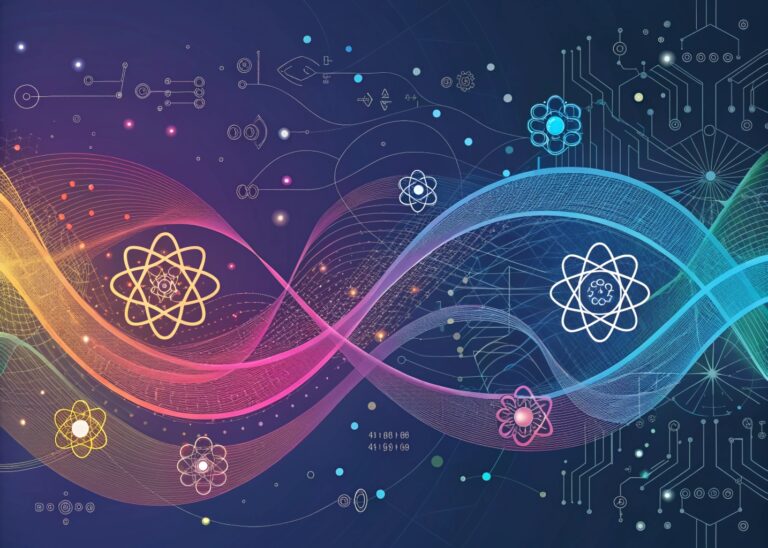Classical AI Powers Quantum Revolution
Quantum computers demand extraordinary precision. These sophisticated machines operate in environments where microscopic disturbances can derail calculations, requiring constant calibration and noise management across complex hardware-software architectures. Classical artificial intelligence emerges as the solution to quantum computing’s most pressing operational challenges.
Deep learning models now accelerate quantum state readout while dramatically improving measurement accuracy in neutral-atom quantum systems. These AI-driven approaches detect parameter drift and characterize quantum states with unprecedented speed, transforming quantum computer performance from the ground up.
Machine Learning Tackles Quantum Error Correction
Fault-tolerant quantum computing hinges on error correction—the ability to identify and fix quantum errors faster than they accumulate. Machine learning algorithms excel at recognizing error patterns and adapting correction strategies in real-time. This AI-powered error correction pushes quantum systems closer to the critical threshold where logical qubits outperform their physical counterparts.
Reinforcement learning optimizes quantum gate pulse sequences, while Bayesian models enhance Hamiltonian learning and quantum control protocols. Rather than competing with quantum technology, classical AI serves as its essential foundation.
Quantum Machine Learning: Promise and Reality
Quantum machine learning represents the reverse proposition—using quantum computers to enhance artificial intelligence capabilities. Theoretical quantum algorithms promise exponential acceleration for specific linear algebra operations that power modern AI, from kernel methods to complex optimization problems.
Quantum computers naturally handle probabilistic calculations, making them potentially superior for sampling from massive probability distributions in generative modeling applications. Quantum Boltzmann Machines could theoretically learn probability distributions that overwhelm classical computational resources.
Current Limitations of Noisy Quantum Devices
Today’s noisy intermediate-scale quantum (NISQ) devices cannot deliver the performance levels required for genuine quantum machine learning advantages. Quantum algorithms claiming superiority over classical methods require error rates and coherence times beyond current capabilities.
Data encoding presents another significant hurdle. Converting classical information into quantum states often requires computational overhead that eliminates any downstream quantum benefits, creating a bottleneck that undermines the entire quantum advantage proposition.
Quantum-Inspired Classical Computing Breakthrough
Quantum-inspired machine learning offers a more immediate path forward. These classical algorithms incorporate quantum mechanical principles while running efficiently on standard GPU hardware. Nvidia’s Contextual Machine Learning model demonstrates this approach, leveraging quantum contextuality concepts to achieve superior performance on classical processors.
This hybrid strategy delivers immediate benefits while positioning for future quantum advantages. As fault-tolerant quantum computers mature, these quantum-inspired classical algorithms can seamlessly transition to true quantum implementations.
Physical AI: Quantum’s Unique Contribution
Jensen Huang’s vision of “physical AI” illuminates quantum computing’s most compelling role in artificial intelligence advancement. Physical AI systems learn from and operate within the physical world, requiring training data that accurately reflects natural phenomena.
Quantum computers can directly sample quantum mechanical processes, accessing physical reality layers that classical systems cannot reach. This capability positions quantum machines as “ground truth generators” for physics-based training data that will revolutionize materials science, chemistry, and pharmaceutical development.
Richard Feynman’s observation that “Nature isn’t classical” underscores this fundamental advantage. Quantum computers can provide AI systems with direct access to quantum mechanical foundations of reality, enriching classical AI pipelines with insights impossible to obtain through classical simulation alone.
Real-World Modeling Applications
The convergence of quantum computing and AI promises unprecedented accuracy in modeling complex physical systems. From molecular interactions in drug discovery to cosmic-scale physics simulations, quantum-enhanced AI could deliver breakthrough capabilities in understanding and predicting natural phenomena.
These applications extend far beyond conversational AI or pattern recognition tasks. The true value lies in computational approaches that classical systems cannot replicate—modeling reality at its most fundamental quantum mechanical level.
Bidirectional Technology Enhancement
The quantum-AI relationship flows in both directions. Currently, artificial intelligence stabilizes and optimizes quantum computers, making them more reliable and scalable. Classical AI algorithms manage quantum noise, calibrate systems, and implement error correction protocols essential for quantum computing progress.
Future quantum computers will reciprocate by generating physics-based training data that classical AI systems cannot produce independently. This symbiotic relationship creates computational capabilities neither technology achieves alone.
Future Implications for Technological Advancement
The intersection of artificial intelligence and quantum computing represents more than combining advanced technologies. It creates fundamentally new computational paradigms that transcend the limitations of either field independently.
Near-term applications focus on AI-enhanced quantum operations, while long-term potential centers on quantum-generated training data for physical AI systems. This progression suggests a technological evolution where quantum and classical computing complement rather than compete with each other.
The most transformative applications will likely emerge in scientific computing domains requiring accurate physical modeling—chemistry, materials science, and fundamental physics research. These fields demand computational approaches that can access and leverage the quantum mechanical nature of reality itself.
As these technologies mature, their convergence promises to unlock scientific and technological capabilities that remain beyond current imagination, fundamentally transforming how we understand and interact with the physical world.
If you are interested in this topic, we suggest you check our articles:
- Quantum Computing: Understanding Its Principles and Industry Applications
- IBM’s Perspective on AI and the Future of Programming According to CEO Arvind Krishna
- Who Created Artificial Intelligence? The AI Evolution Explained
Sources: Forbes
Written by Alius Noreika

